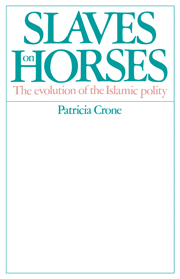Book contents
- Frontmatter
- Contents
- Preface
- A note on conventions
- PART I INTRODUCTION
- PART II THE EVOLUTION OF THE CONQUEST SOCIETY
- PART III THE FAILURE OF THE ISLAMIC EMPIRE
- 9 The abortive service aristocracy
- 10 The emergence of the slave soldiers
- 11 The emergence of the medieval polity
- APPENDICES
- Notes
- Bibliography
- General index
- Prosopographical Index
11 - The emergence of the medieval polity
Published online by Cambridge University Press: 06 July 2010
- Frontmatter
- Contents
- Preface
- A note on conventions
- PART I INTRODUCTION
- PART II THE EVOLUTION OF THE CONQUEST SOCIETY
- PART III THE FAILURE OF THE ISLAMIC EMPIRE
- 9 The abortive service aristocracy
- 10 The emergence of the slave soldiers
- 11 The emergence of the medieval polity
- APPENDICES
- Notes
- Bibliography
- General index
- Prosopographical Index
Summary
The adoption of the mamlūk, institution by the ʻAbbāsids was followed almost immediately by fainéance of the caliphal office and disintegration of the caliphal state. It is clearly not the case that slave armies necessarily entail either one or the other: the caliphs might have stayed in power, if only in Iraq, just as the unitary state might have survived, if only as a sultanate. But it is not very likely that the adoption of the new armies and the onset of general disorder simply happened to coincide. How then is the disorder to be explained? The key to the explanation must clearly lie in the manner in which the peculiar nature of the mamlūk institution interacted with the peculiar legacy of the ʻAbbāsids.
It is in the nature of slave armies that they can easily get out of hand: because they are private in character, their discipline turns to a greater extent than is usually the case on the personal forcefulness of the ruler. There were various ways in which the institution could be rendered more sensitive to such forcefulness, and the ʻAbbāsids might have been better off if they had not been beginners. Both the isolation and the homogeneity of the Samarran slaves probably exceeded the safety limit; when the ruler and his troops came out of their joint quarantine, generational recruitment of new slaves replaced Muʻtaṣim's grandiose attempt to breed them, and free mercenaries and other elements were brought in to balance the Turks; the institution thus certainly became more amenable to control.
- Type
- Chapter
- Information
- Slaves on HorsesThe Evolution of the Islamic Polity, pp. 82 - 92Publisher: Cambridge University PressPrint publication year: 1980
- 1
- Cited by



